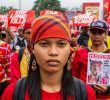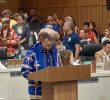DAVAO CITY – The Human Rights Watch is urging the Philippine government to invite the United Nations to look into the accusations of a witness who claimed to be a former “hitman” linking President Rodrigo Duterte to extrajudicial killings.
Brad Adams, Asia director at Human Rights Watch said the testimony of Edgar Matobato during the Senate hearing on extrajudicial killings “are very serious allegations that require an independent investigation.”
“President Duterte can’t be expected to investigate himself, so it is crucial that the United Nations is called to lead such an effort. Otherwise, Filipinos may never know if the president was directly responsible for extrajudicial killings,” Adams said in a press release on Friday, September 16.
Adams said “the most recent Philippine National Police data show that from July 1 to September 4, police killed an estimated 1,011 suspected “drug pushers and users,” more than 14 times the 68 such police killings recorded between January 1 and June 15. Police blame the killings on suspects who “resisted arrest and shot at police officers,” but refuse to launch an investigation into the deaths.”
’47’ suspected drug personalities killed daily
Senator Leila De Lima, chairperson of the Senate Committee on Justice and Human Rights which is conducting a probe on the spate of extrajudicial killings and summary executions related to the government’s “war on drugs” said “more than 58 percent” of the killings are identified as vigilante killings.
She said the killings in the country can now be compared to what happened in Davao City during the 1990s under the leadership of former city mayor and now President Rodrigo Duterte for more than two decades.
She said based on the data presented by Philippine National Police Director General Ronald dela Rosa during the first Senate inquiry on August 22 there were 712 suspected drug-related individuals killed during police operations since July 1. While 1,067 people who were killed are under investigation. She said the total number of 1,779 killed translates to 35 people killed daily.
De Lima on Wednesday said the number of those killed now reached 3,526, or around 47 people killed daily. She said 2,035 of these cases have unidentified assailants.
Lambada Boys
Matobato testified as supposedly a former member of the DDS and a former Civilian Armed Forces Geographical Unit (Cafgu) member during the Senate hearing on the cases of extrajudicial killings on Thursday, September 15. He said that he was involved in the killings of petty criminals and suspected drug personalities in the city and that the killings were ordered by former mayor and now President Rodrigo Duterte.
Matobato, 57, said he joined the Citizen Armed Forces Geographical Unit under the Army’s Scout Ranger Battalion in Calinan district here in 1982.
After six years, he said he was taken to be part of the “Lambada Boys”, which he described as a “liquidation squad” composed of seven men.
“Our job is to kill criminals, drug pushers, rapists everyday,” he said.
He said the group grew in 1993 which at that time was joined by rebel returnees and police. The group was then known as the Davao Death Squad that was allegedly behind the extrajudicial killings in the city.
In 2009, Human Rights Watch published “‘You Can Die Any Time’: Death Squad Killings in Mindanao,” which details the involvement of police and local government officials in targeted death squad killings in Davao City during Duterte’s time as mayor.
After five years, the Human Rights Watch published another report titled, “‘One Shot to the Head’: Death Squad Killings in Tagum City, Philippines,” which documents police involvement in Tagum City, Davao del Norte province.
Police denies allegations
Davao City Police Office chief Senior Superintendent Michael John Dubria has belied the testimony of a witness who introduced himself as a former hitman of the alleged Davao Death Squad (DDS) linking President Rodrigo Duterte and several police officials to extrajudicial killings.
Dubria called Matobato’s statement “malicious”. “I think that is a malicious accusation. Statements like that should be supported by evidences, otherwise it is only an accusation or rumors,” he told reporters during the I-speak media conference on Thursday, September 15.
On Friday, September 16, Secretary of Justice Atty. Vitaliano Aguirre said the Senate hearing was a waste of government’s resources.
“It was not a hearing of extrajudicial killing, it was a case of extrajudicial lying,” Aguirre said in a statement.
He said he believes the hearing is “a desperate measure to mask the effect of the forthcoming House of Representatives Committee on Justice hearing on the proliferation of drugs at the Bilibid prison” where Senator De Lima is allegedly linked.
On August 25, President Duterte released a ‘matrix’ linking De Lima to drug personalities in the New Bilibid Prison.
Stop the killings
Meanwhile, a network against extrajudicial killings, said the issue should be spared from partisan politics.
Cora Agovida of Stop the Killings Network said the Senate inquiry is “clearly serving partisan politics rather than resolving the roots of drug use and extra-judicial killings.”
Agovida said, “politicking should not distract us from pursuing truth and justice.”
She added, “While politicians trade barbs and insults, the killings continue. The political circus is a disservice to all those who want justice and truth to prevail.”
She said the protection of human rights “should be the overriding concern of all.”
“We urge the President to address the accusations against him, but more importantly, we want him to decisively do something about the rampant killings today that victimize the poor and powerless,” says Agovida.(davaotoday.com)









